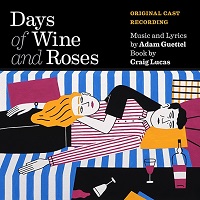 Original Cast, 2023 (Nonesuch)
Original Cast, 2023 (Nonesuch)  (5 / 5) Days of Wine and Roses marks the first musical with a score by composer/lyricist Adam Guettel that has been produced since Guettel’s triumph with The Light in the Piazza in 2005, and it was well worth the wait. Recorded in advance of the show’s Broadway premiere but after its initial production at the Atlantic Theater Company, this cast album is a beautiful gut punch. The music is different from any Broadway score of recent memory — full of earworms without being simple, and harmonically fascinating while remaining deliciously tonal. The orchestrations, which delight the ear, were also provided by Guettel. With a book by Craig Lucas, Days of Wine and Roses is based on the film of the same title. Brian d’Arcy James and Kelli O’Hara star as the show’s central couple, Kirsten Arnesen and Joe Clay, who meet on a boat (the album begins with the sound of rushing waves) and end up embarking on a devastating descent into alcoholism, each pulling the other further down. “Evanesce,” the song that the couple sings when they start drinking together, is a jazzy delight, complicated by ominous lyrics that predict their future (“Two dolphins breaking away / Two dolphins right to the grave/ Are we”). With the exception of the sweet-voiced Ella Dane Morgan as the couple’s young daughter, Lila, hardly any other performers are heard on the album; but James and O’Hara sing so well, and their voices blend so beautifully, that listeners won’t mind at all. O’Hara’s soprano has only become more colorful and expansive since she starred in Piazza, and “There Go I,” a beautiful ballad with evocative lyrics, serves as a showcase for her wondrous talent. “As The Water Loves The Stone” is one of the most heartfelt love songs this reviewer has ever heard, while the couple’s individual “mad scene” songs, “435” and “Morton Salt Girl,” would serve as playgrounds for any actor. The overall tone of the score is very sad, and many listeners may find themselves becoming emotional. It’s hard not to cry during “Turlycue,” the plaintive duet between a suffering mother and a confused daughter, and the joyfulness of “First Breath” becomes quite moving due to the direction of the plot. No musical theater maven should be without this recording; whether it haunts you, inspires you, or even triggers you, it’s certain to have a profound effect. — Charles Kirsch
(5 / 5) Days of Wine and Roses marks the first musical with a score by composer/lyricist Adam Guettel that has been produced since Guettel’s triumph with The Light in the Piazza in 2005, and it was well worth the wait. Recorded in advance of the show’s Broadway premiere but after its initial production at the Atlantic Theater Company, this cast album is a beautiful gut punch. The music is different from any Broadway score of recent memory — full of earworms without being simple, and harmonically fascinating while remaining deliciously tonal. The orchestrations, which delight the ear, were also provided by Guettel. With a book by Craig Lucas, Days of Wine and Roses is based on the film of the same title. Brian d’Arcy James and Kelli O’Hara star as the show’s central couple, Kirsten Arnesen and Joe Clay, who meet on a boat (the album begins with the sound of rushing waves) and end up embarking on a devastating descent into alcoholism, each pulling the other further down. “Evanesce,” the song that the couple sings when they start drinking together, is a jazzy delight, complicated by ominous lyrics that predict their future (“Two dolphins breaking away / Two dolphins right to the grave/ Are we”). With the exception of the sweet-voiced Ella Dane Morgan as the couple’s young daughter, Lila, hardly any other performers are heard on the album; but James and O’Hara sing so well, and their voices blend so beautifully, that listeners won’t mind at all. O’Hara’s soprano has only become more colorful and expansive since she starred in Piazza, and “There Go I,” a beautiful ballad with evocative lyrics, serves as a showcase for her wondrous talent. “As The Water Loves The Stone” is one of the most heartfelt love songs this reviewer has ever heard, while the couple’s individual “mad scene” songs, “435” and “Morton Salt Girl,” would serve as playgrounds for any actor. The overall tone of the score is very sad, and many listeners may find themselves becoming emotional. It’s hard not to cry during “Turlycue,” the plaintive duet between a suffering mother and a confused daughter, and the joyfulness of “First Breath” becomes quite moving due to the direction of the plot. No musical theater maven should be without this recording; whether it haunts you, inspires you, or even triggers you, it’s certain to have a profound effect. — Charles Kirsch

